The Movie Book (Big Ideas Simply Explained) (2016)
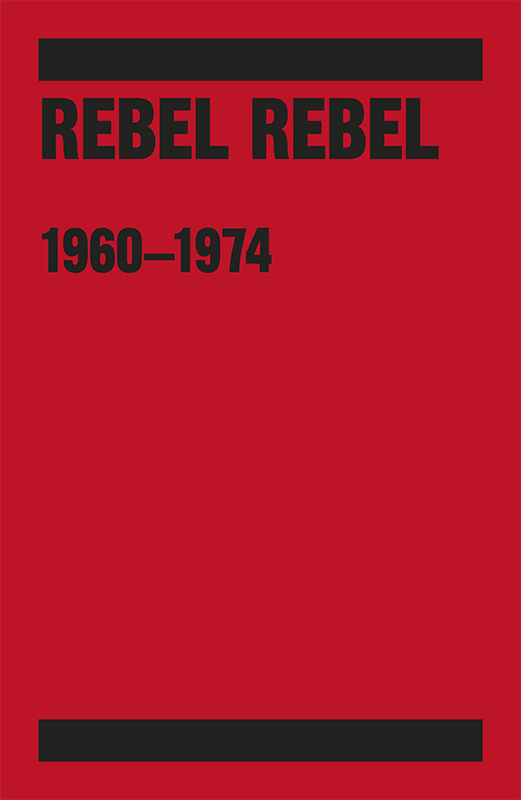
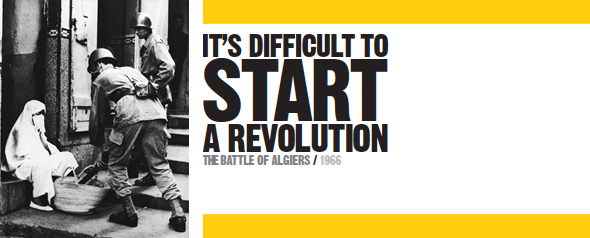
IN CONTEXT
GENRE
War, political
DIRECTOR
Gillo Pontecorvo
WRITERS
Gillo Pontecorvo, Franco Solinas
STARS
Jean Martin, Brahim Hadjadj, Yacef Saadi
BEFORE
1960 Pontecorvo’s movie Kapò is one of the first attempts to depict the horrors of the Holocaust on screen.
AFTER
1969 Pontecorvo’s Burn! stars Marlon Brando as a British agent who manipulates a slave revolt on a Caribbean island to pervert it in the interests of big business.
2006 Ken Loach’s The Wind that Shakes the Barley tells the story of Republican fighters in the Irish War of Independence.
There are many ways to tackle war and political strife in fiction. Filmmakers can approach it from a humanist perspective, following civilians as the external conflict escalates around them, or follow rank-and-file soldiers as they carry out their duties, and examine the moral crises they face in doing so.
The majority of movies about conflict tend to take one of these two perspectives. The Battle of Algiers, however, adopts a journalistic perspective instead to follow Algeria’s attempts to gain independence from the French. That is to say, it approaches the conflict forensically, its narrative following the progression of significant events. While it does have prominent figures in its narrative, particularly Ali La Pointe, one of the leaders of the Algerian resistance, it is not the story of any one individual. The movie is, as the title suggests, the story of the Battle of Algiers. Director Gillo Pontecorvo’s camera mimics that of a photojournalist on the streets, capturing events from an objective remove.
“Give us your bombers, and you can have our baskets.”
Ben M’Hidi / The Battle of Algiers
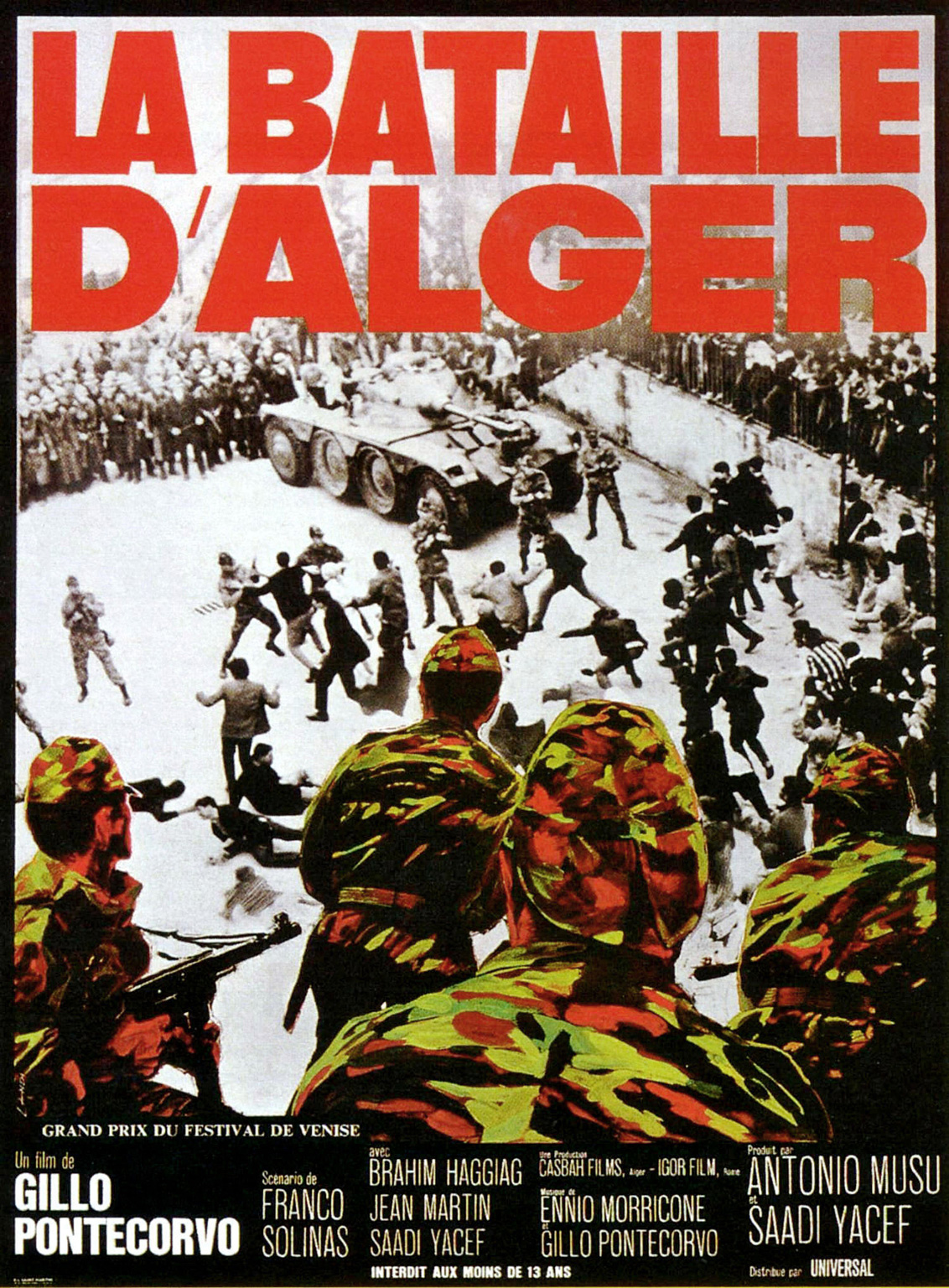
With its use of documentary-style filming techniques, the movie’s large crowd scenes resemble real newsreel footage.
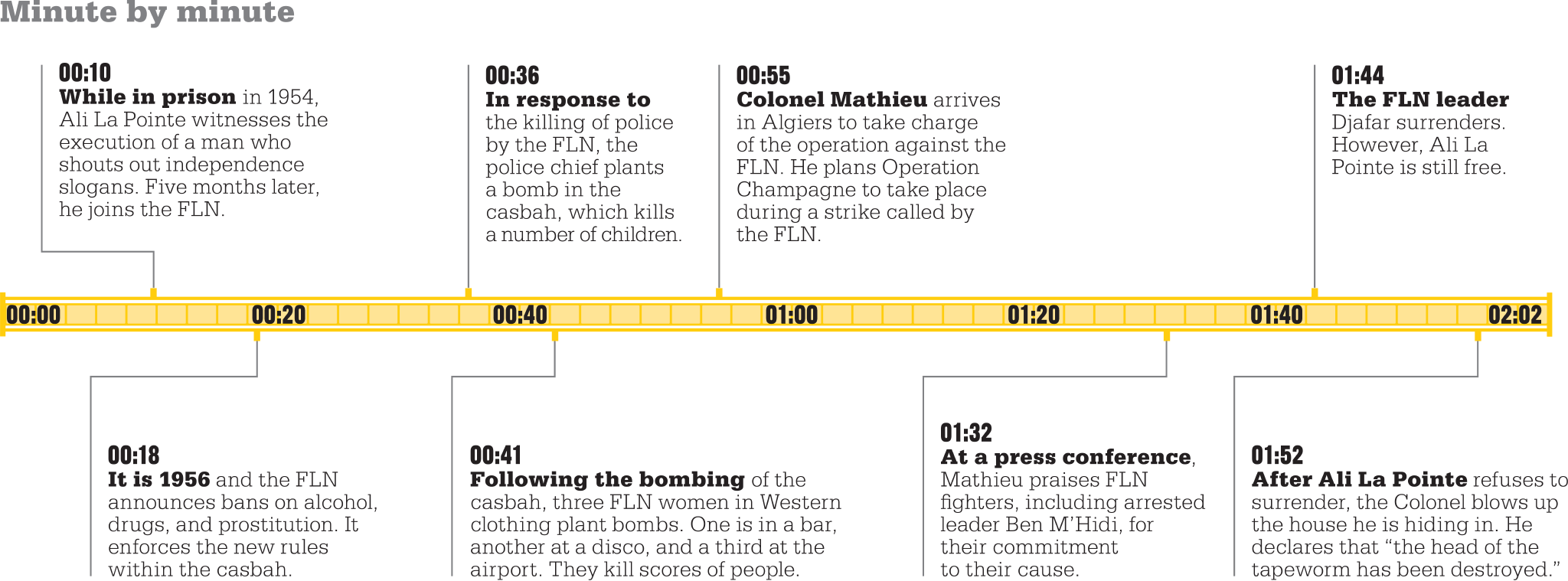
The cost of terror
In its depiction of the horrors of conflict, The Battle of Algiers raises questions about right and wrong in war that are still relevant today. Pontecorvo portrays both sides very evenhandedly. The Algerian independence fighters, the FLN (National Liberation Front), lack the means or manpower to confront the occupying French military police in direct battle, so instead they resort to guerrilla warfare and terrorism. They employ children as messengers and have devout Muslim women Westernize their appearance in order to gain access to the European quarter. Their targets are not military, but rather civilian areas such as cafés and airports that are frequented by Europeans.
The sequence with the women is particularly telling as to the cost of the fight, as we watch while they cut off their hair, rid themselves of their hijabs and remove any trace of their cultural and religious identity for the greater good as they would see it. They kill random Europeans, upon whose faces the camera dwells before the blasts, but there is no triumphalism from the women—in their eyes, they are committing a necessary evil.
The French military make their own compromises with morality, as they resort to violent interrogation and torture in order to obtain the information required to bring the FLN down. The movie begins and ends with an Algerian man, tortured beyond comprehension, dressed humiliatingly in a French military uniform. Colonel Mathieu, the ranking officer in charge of bringing down the resistance movement, chastises one of the soldiers when they mock him for his appearance. This moment mirrors the later bombing, where Mathieu indicates that something of themselves—their pride, their moral high ground—has been given up in pursuit of victory. The movie views both sides’ losses with equal regret, as the same mournful music is played over the massacred French civilians as the dead Algerians after military raids. It asks the question: what matters more in warfare, winning or keeping your soul in the process? And it asks the same question of both sides.
"The Battle of Algiers is a training film for urban guerrillas."
Jimmy Breslin
New York Daily News, 1968

Ali (Brahim Hadjadj, right) is recruited to the FLN by Djafar (Yacef Saadi, second left). Saadi fought with the FLN, and the character Djafar was partly based on Saadi himself.
The role of the media
The Battle of Algiers poses several questions about the role of the media in modern warfare. Both sides seem to understand that just as important as winning the physical battles is winning the hearts and minds of the media and thus the world. After a series of violent and terrorist acts, the FLN decides that their next move will be a strike, in which all operatives are to lay down their weapons. The restless Ali questions this action, but is informed by his superior that to win the freedom they desire, they must make the transition in the world’s eyes from terrorists to freedom fighters.
Mathieu’s approach is similarly media conscious, and he confronts a room full of journalists about their “have their cake and eat it” attitude to the conflict. They disapprove of Mathieu’s methods, but believe France should remain in Algeria. He points out that his methods are the only way to achieve that. He understands the pyramid cell structure of the FLN, and that torturing suspects is the only way to move up that pyramid to the leadership—as he puts it, to “cut off the head of the tapeworm.”
The 20th century saw the world become a global community, in which advances in communication technology meant that no war could pass out of sight, no violent act be hidden. The Battle of Algiers proposes that winning a modern conflict is not necessarily about might. Mathieu is a stronger tactician than the FLN and gradually defeats the group on the ground, and yet, ultimately, Algeria still gains independence, because the FLN’s action ignited public opinion about the country’s right to self-determination. Mathieu won the battle in Algiers, but ultimately the French lost the war.
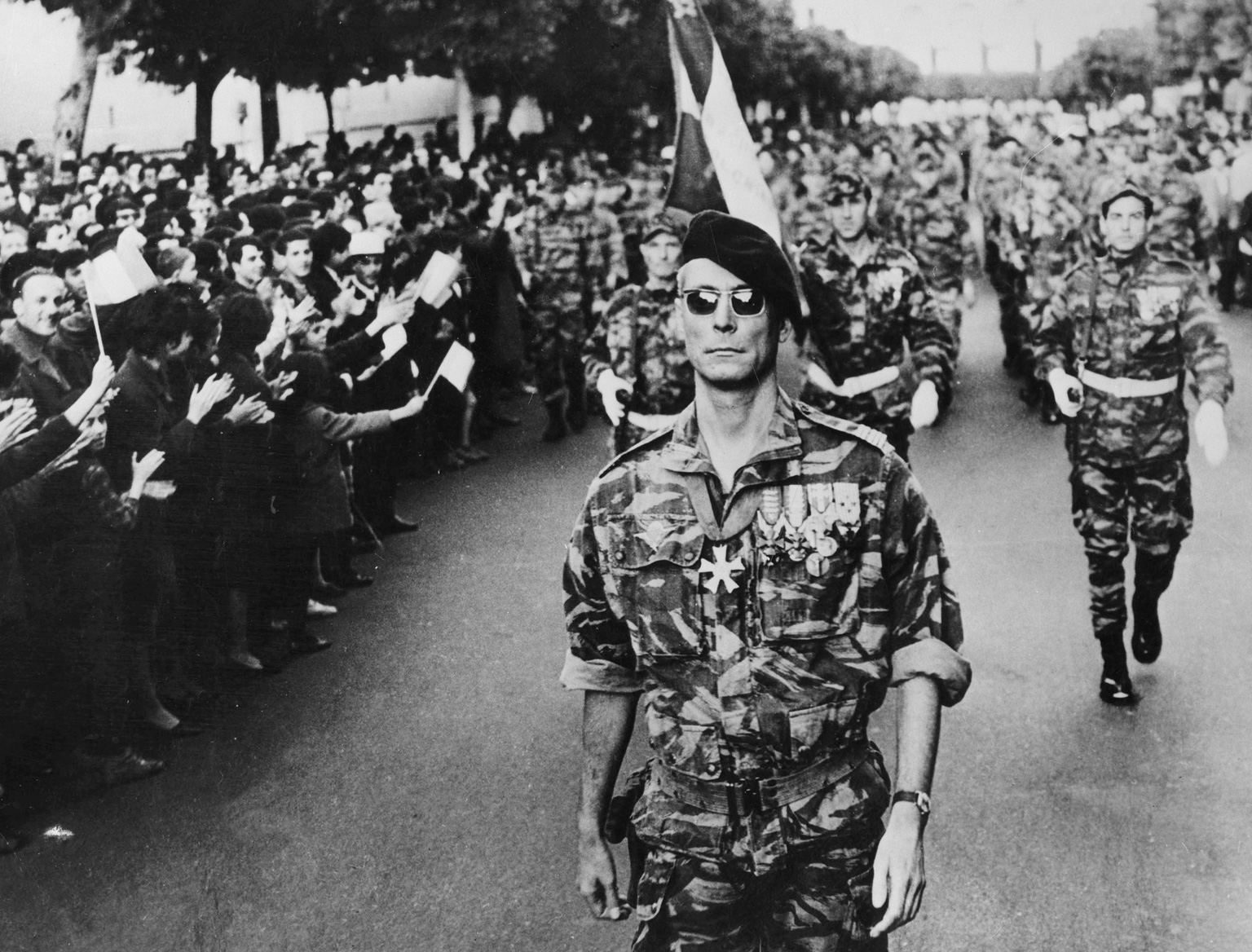
Colonel Mathieu (Jean Martin) is sent to Algiers to defeat the FLN in the wake of an escalation of violence from both sides.
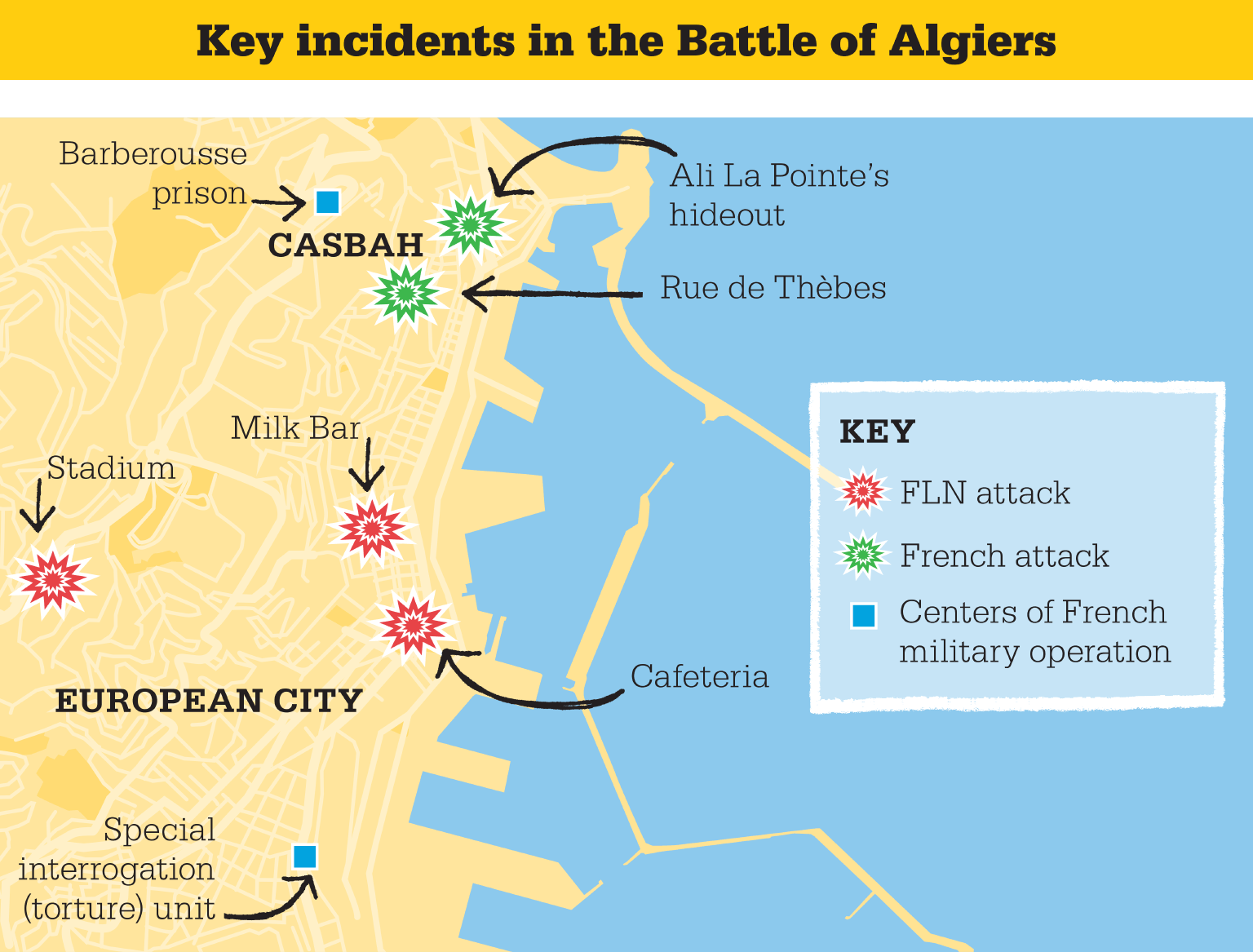
The nature of war
The Battle of Algiers is a movie about the Algerian struggle for independence, yet it is also a movie about the nature of conflict. Its themes are universal, and the questions it poses about the lines people cross for what they believe are still extremely pertinent and difficult to answer. It is also perhaps the most clear-headed movie about war ever made, not swayed by the emotions that might cloud the issue, interested in the cold tactics of both sides without overtly demonizing either side. The movie clearly believes in Algeria’s right to independence, but at the same time has respect for Mathieu’s honesty, dignity, and competence. In the end, it even allows him a moment of decency as he pleads with Ali to allow the teenage boy in his company to leave the field of battle. This moment defines the whole movie. War is not simply about having a just cause. It is also about what we do in its name.
"How to win a battle against terrorism and lose the war of ideas. Children shoot soldiers at point-blank range. Women plant bombs in cafes. Soon the entire Arab population builds to a mad fervor. Sound familiar?"
Poster for screening at the Pentagon, 2003
GILLO PONTECORVO Director
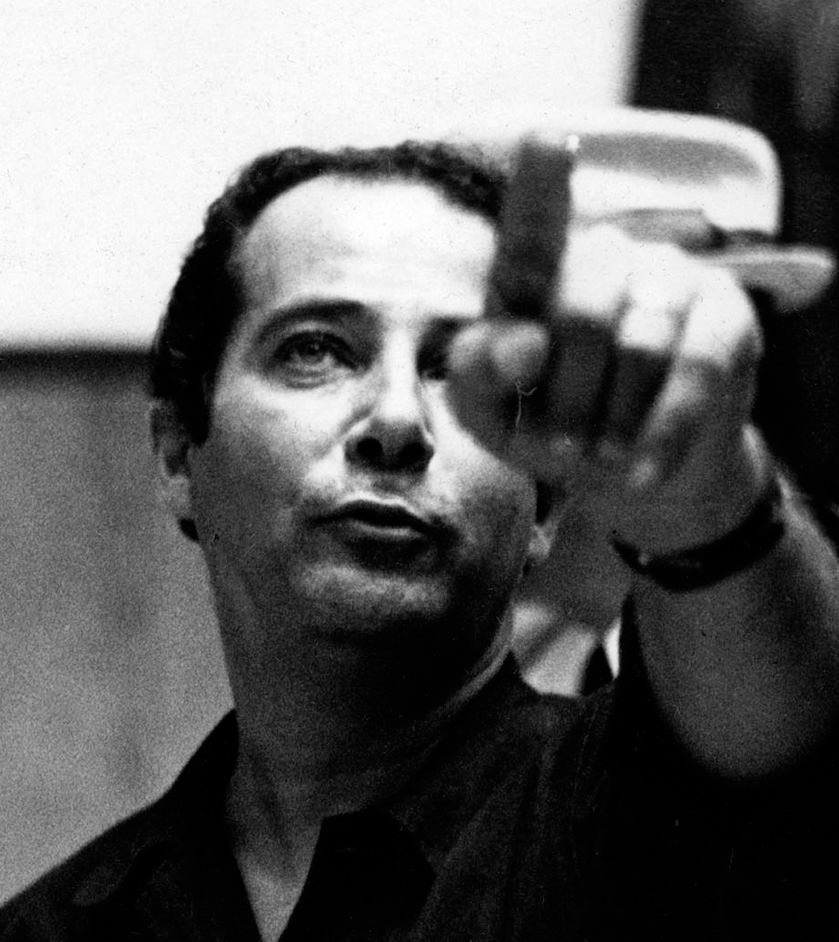
Gillo Pontecorvo was born in Pisa, Italy in 1919. His first job in the movie industry was in Paris working as an assistant to Joris Ivens, a Dutch documentary filmmaker with Marxist views. Pontecorvo shared Ivens’ politics, becoming a member of the Italian Communist Party in 1941. He was primarily a documentary filmmaker, and The Battle of Algiers was one of the few times Pontecorvo ventured into more overtly dramatic work. He remained true to his documentarian principles, however, hiring mostly nonprofessional actors, including the ex-FLN leader Yacef Saadi. Pontecorvo died from heart failure in Rome in 2006.
Key movies
1960 Kapò
1966 The Battle of Algiers
1969 Burn!
1979 Ogro
What else to watch: Battleship Potemkin (1925) ✵ Kapò (1960) ✵ All the President’s Men (1976) ✵ Reds (1981) ✵ Waltz with Bashir (2008) ✵ Zero Dark Thirty (2012)